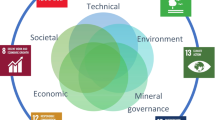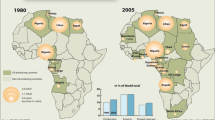Abstract
The oil exploration and exploitation industry which is majorly centred in the Niger Delta region is without doubt currently the most important earner of foreign exchange to the Nigerian economy. The Niger Delta is home to an extraordinary variety of people; mostly fishers and farmers with a history of rich cultural heritage. However, the region is suffering from devastating oil pollution. Although the effects of oil spill depend on factors such as size or area of spill and geographical location, the socioeconomic and environmental costs of oil production can be extensive; these range from destruction of wildlife, biodiversity loss, air and water pollution, degradation of farmland and damage to aquatic ecosystems. The paper reviews the adverse effects of oil exploitation on the Niger Delta region. It researches the common belief that government and oil multinationals are negatively disposed to the socioeconomic and environmental wellbeing of host communities especially in events of oil spillage. The paper reveals that oil exploitation has increased the rate of environmental degradation and has perpetuated food insecurity as a result of death of fish and crops as well as loss of farm lands and viable rivers for fishing activities leading to loss of livelihood. The paper supports the call for multinationals operating in the region to modernise operating infrastructure and equipment in order to prevent avoidable oil spillages that often lead to community restiveness, and more so, intensification of joint efforts between oil multinationals and government in the capital development of the region is very important.

Similar content being viewed by others
References
Adeogun OA, Ogunbadejo HK, Ayinla OA et al (2007) Urban aquaculture: producer perceptions and practices in Lagos State, Nigeria. Middle-East J Sci Res 2:21–27
Africapolis Team (2008) Urbanization trends 1950–2020: a geo-statistical approach. Analytical report. Africapolis, AFD-SEDET. Available from: http://www.afd.fr/jahia/webdav/site/afd/users/administrateur/public/publications/BT/Africapolis_Final-Report_EN.pdf
Agboola T, Olurin T (2003) Land use and land cover change in the Niger Delta. Excerpt from a research paper presented to the centre for democracy and development
Akhionbare AE, Osuji EE (2013) Effect of oil exploration on socio-cultural issues in Oguta local government area of Imo State, Nigeria. J Environ Issues Agri Dev Ctry 5(2):19–24
Akinlo AE (2012) How important is oil in Nigeria’s economic growth? J Sustain Dev 5:165–179. doi:10.5539/jsd.v5n4p165
Akpan NS (2010) Governance and communal conflicts in a post-democratic Nigeria: a case of the oil-producing Niger Delta Region. J Afr Stud Dev 2(3):065–074
Apata TG (2010) Linkages between crude-oil exploration and agricultural development in Nigeria: implications for relevant qualitative data collection and analysis to improve rural economy. http://www.fao.org/fileadmin/templates/ess/pages/rural/wye_city_group/2010/May/WYE_2010.4.3_Apata.pdf
Aworawo (2000) The impact of environmental degradation of the rural economy of the Niger Delta. In: Osuntokun and Akinjde (ed) Envronmental problems of the Niger Delta, 155. Lagos: Friedrich Ebert Foundation
Ayodele OS, Obafemi FN, Ebong FS (2013) Challenges facing the achievement of the Nigeria vision 20:2020. Glob Adv Res J Soc Sci 2:143–157
Babatunde A (2010) Managing environmental conflict in the Ilaje oil producing areas of the Niger Delta, Nigeria. J Sustain Dev Afr 12(3):164–179
Baghebo M, Atima TO (2013) The impact of petroleum on economic growth in Nigeria. Glob Bus Econ Res J Glob Bus Econ Res J Baghebo Atima Glob Bus Econ Res J 2:2302–4593
Boko M, Niang I, Nyong A, Vogel C, Githeko A, Medany M, Osman-Elasha B, Tabo R, Yanda P (2007) Africa. Climate change 2007: impacts, adaptation and vulnerability. In: by Parry ML, Canziani OF, Palutikof JP, van der Linden PJ, Hanson CE (ed) Contribution of working group II to the fourth assessment report of the intergovernmental panel on climate change, 433–467. Cambridge University Press, Cambridge UK
Bowen GA (2009) Document analysis as a qualitative research. Qual Res J 9(2):27–40
Central Bank of Nigeria (2015) Exchange rates. Available at: www.cbn.gov.ng/rates/ExchangeArchives.asp
Chambwera M, Stage J (2010) Climate change adaptation in developing countries: issues and perspectives for economic analysis
Clancy J, Maduka O, Lumampao F (2007) Sustainable energy systems and the urban poor: Nigeria, Brazil, and the Philippines. Urban Energy Transit 533–562
Dabbs WC (1996) Oil production and environmental damage
Department of Petroleum Resources (1997) Annual reports. Department of petroleum resources, Abuja, pp 191
Ebegbulem JC, Ekpe D, Adejumo TO (2013) Oil exploration and poverty in the Niger Delta Region of Nigeria: a critical analysis. Int J Bus Soc Sci 4:279–287
Echefu N, Akpofure E (2002) Environmental impact assessment in Nigeria: regulatory background and procedural framework. EIA Train Resour Man 63–74
Ekiye E, Zejiao L (2010) Water quality monitoring in Nigeria; Case study of Nigeria’s industrial cities. J Am Sci 6:22–28
Elum ZA (2014) Economic effects of corruption on developing economies. Agric Econ Ext Res Stud 3:36–47
Eteng LA (1996) Minority rights under Nigeria’s federal structure. In: Proceedings of the Conference on Constitutions and Federalism. Lagos: University of Lagos Press, pp 111–168
Eweje G (2006) Environmental costs and responsibilities resulting from oil exploitation in developing countries: the case of the Niger Delta of Nigeria. J Bus Ethics 69:27–56. doi:10.1007/sl0551-006-9067-8
Federal Government of Nigeria [FGN] (2009) Nigeria vision 20: 2020 economic transformation blueprint. Abuja: National Planning Commission
Frynas JG (2000) Oil in Nigeria: conflict and litigations between oil companies and village communities. LIT Verlag Munster-Hamburg
Gylfason T (2001) Natural resources, education, and economic development. Eur Econ Rev 45:847–859. doi:10.1016/S0014-2921(01)00127-1
Ibaba S (2001) Understanding the Niger Delta crisis. Jiral Publication Company, Port Harcourt
Ikelegbe A (2005) Engendering civil society: oil, women groups and resource conflicts in the Niger Delta region of Nigeria. J Mod Afr Stud 43:241–270. doi:10.1017/S0022278X05000820
Inoni OE, Omotor DG, Adun FN (2006) The effect of oil spillage on crop yield and farm income in Delta State, Nigeria. J Cent Eur Agric 7:41–48
Intergovernmental Panel on Climate Change [IPCC] (2007a) Climate change 2007: the physical science basis. Cambridge University Press, Cambridge
Intergovernmental Panel on Climate Change [IPCC] (2007a) Climate change 2007: impacts, adaptation and vulnerability. Cambridge, United Kingdom
International Crisis Group (2006) Fuelling the Niger Delta Crisis
Iwayemi A (2008) Nigeria’s dual energy problems: policy issues and challenges. In: International association for energy economics. Istanbul, Turkey, pp 17–21
Kadafa AA (2012) Oil exploration and spillage in the Niger Delta of Nigeria. Civ Environ Res 2(3):31–51
Kankara AI (2013) Examining environmental policies and laws in Nigeria. Int J Environ Eng Manag 4:165–170
Kellett J (1990) The environmental impact of wind energy developments. Town Plan Rev 61:139–155
Ladan MT (2012) Review of NESREA Act 2007 and regulations 2009–2011: a new dawn in environmental compliance and enforcement in Nigeria. LawEnviron Dev J 8:118–137
Mitchell RB (2003) A survey of their features, formation, and effects. Annu Rev Environ Resour 28:429–461. doi:10.1146/annurev.energy.28.050302.105603
Mogalakwe M (2006) The use of documentary research methods in social research. Afr Soc Rev 10(1):221–230
Mpandeli S, Maponya P (2014) Constraints and challenges facing the small scale farmers in Limpopo Province, South Africa. J Agric Sci 6:135–143. doi:10.5539/jas.v6n4p135
Nyong T (2012) Nigeria: oil spill hits Atlantic coastline in Akwa Ibom. Available at: http://allafrica.com/stories/201208290513.html
Obasohan EE, Agbonlahor DE, Obano EE (2010) Water pollution: a review of microbial quality and health concerns of water, sediment and fish in the aquatic ecosystem. Afr J Biotechnol 9:423–427
Odularu GO (2008) Crude oil and the Nigerian economic performance. In: Oil gas bus. http://www.ogbus.ru/eng/. Accessed 20 Sep 2015
Oguduvwe JP (2013) Poverty in oil rich delta: a study of selected oil producing communities in delta state, Nigeria. Glob Res J Educ 3:1–11
Oguine I (1999) Nigeria’s oil revenues and the oil producing areas. J Energy Nat Res Law 2:111–120
Okonjo-Iweala N, Osafo-Kwaako P (2007) Nigeria’s economic reforms progress and challenges. Washington, DC 20036
Olaseni M, Alade W (2012) Vision 20:2020 and the challenges of infrastructural development in Nigeria. J Sustain Dev 5:63–76. doi:10.5539/jsd.v5n2p63
Omoweh DA (1995) Shell, environmental pollution, culture and health in Nigeria: the sad plight of Ughelli oil communities. Africa Spectr 30:115–143
Onosode G (2000) Environmental management and sustainable development in the Niger Delta. In: Osuntokun and Akinjde (ed) Envronmental problems of the Niger Delta, 155. Lagos: Friedrich Ebert Foundation
Orisakwe O (2011) Nigeria: environmental health concerns. Encycl Environ Heal 114–124
Oromareghake P, Arisi RO, Igho MO (2013) Youth restiveness and insecurity in Niger Delta: a focus on delta state. Glob J Hum Soc Sci 13:46–53
Osoba SO (1996) Corruption in Nigeria: historical perspectives. Rev Afr Pol Econ 23(69):371–386
Osuntokun A (2000) Environmental problems of the Niger Delta. Friedrich Ebert Foundation, Lagos
Otusanya OJ (2011) The role of multinational companies in tax evasion and tax avoidance: the case of Nigeria. Crit Perspect Account. doi:10.1016/j.cpa.2010.10.005
Ovadia JS (2014) Local content and natural resource governance: the cases of Angola and Nigeria. Biochem Pharmacol 1:137–146. doi:10.1016/j.exis.2014.08.002
Oviasuyi PO, Uwadiae J (2010) The dilemma of niger-delta region as oil producing States of Nigeria. J Peace Confl Dev 16:110–126
Raustiala K (1997) NGOs and international environmental institutions. Int Stud Q 41:719–740
Ridderhof R (2013) Shell and Ogoni people : (s) oil pollution in the Niger Delta. http://www.peacepalacelibrary.nl/2013/02/shell-and-ogoni-people-soil-pollution-in-the-niger-delta/. Accessed 30 Sep 2015
Sala-I-Martin X, Subramanian A (2003) Addressing the natural resource curse: an illustration from Nigeria
Schofer E, Hironaka A (2005) The effects of world society on environmental protection outcomes. Soc Forces 84:25–47
Shaaban M, Petinrin JO (2014) Renewable energy potentials in Nigeria: meeting rural energy needs. Renew Sustain Energy Rev 29:72–84. doi:10.1016/j.rser.2013.08.078
Suckall N, Fraser E, Forster P, Mkwambisi D (2015) Using a migration systems approach to understand the link between climate change and urbanisation in Malawi. Appl Geogr 63:244–252. doi:10.1016/j.apgeog.2015.07.004
United Nations Environment Programme [UNEP] (2012) Compilation of internationally agreed environmental goals and objectives. Nairobi
Watson J, Kern F, Gross M et al (2012) Carbon capture and storage: realising the potential?
Worgu SO (2000) Hydrocarbon exploitation, environmental degradation and poverty in the Niger Delta region of Nigeria. Lund University Lumes Programme, Lund
Workman D (2016) Crude oil exports by country. Available at: http://www.worldstopexports.com/worlds-top-oil-exports-country/Accessed 23 Mar 2016
Author information
Authors and Affiliations
Corresponding author
Additional information
Responsible editor: Philippe Garrigues
Rights and permissions
About this article
Cite this article
Elum, Z.A., Mopipi, K. & Henri-Ukoha, A. Oil exploitation and its socioeconomic effects on the Niger Delta region of Nigeria. Environ Sci Pollut Res 23, 12880–12889 (2016). https://doi.org/10.1007/s11356-016-6864-1
Received:
Accepted:
Published:
Issue Date:
DOI: https://doi.org/10.1007/s11356-016-6864-1




